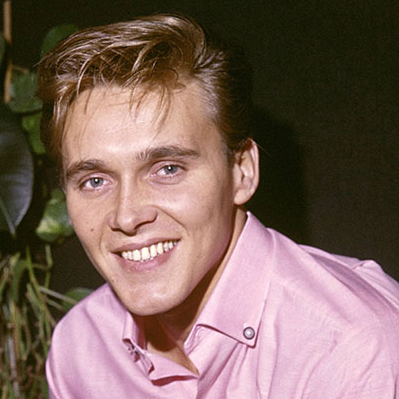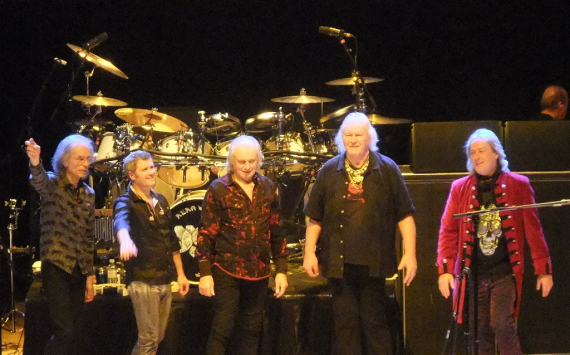- 1. Early life
- 2. Career
- 2.1. Early career
- 2.2. UK chart and film success
- 2.3. Later years

WYCHERLEY
Ronald
(Billy
Fury)
English musician
Date of Birth: 17 April 1940
Date death: 28 January 1983
Age at the time of death: 42 years old
Zodiac sign: Aries
Profession: Musician
Biography
Ronald Wycherley (Billy Fury) was an English singer, musician, songwriter, and actor. An early star of both rock and roll and films, he equalled the Beatles' record of 24 hits in the 1960s and spent 332 weeks on the UK chart, though he never had a chart-topping single or album.
AllMusic journalist Bruce Eder stated that Fury's "mix of rough-hewn good looks and unassuming masculinity, coupled with an underlying vulnerability, all presented with a good voice and some serious musical talent, helped turn him into a major rock and roll star in short order". Others have suggested that his rapid rise to prominence was due to his "Elvis-influenced hip swivelling and, at times, highly suggestive stage act".
Early life
Fury was born Ronald Wycherley at Smithdown Hospital (later Sefton General Hospital and now demolished) on Smithdown Road in Liverpool on 17 April 1940. He commenced music lessons on the piano before he was a teenager, and was bought his first guitar by the age of 14. Wycherley fronted his own group in 1955, but simultaneously worked full-time on a tugboat and later as a docker. He entered and won a talent competition, and by 1958 had started composing his own songs.
Career
Early career
Wycherley went to meet pop manager and impresario Larry Parnes at the Essoldo Theatre in Birkenhead, hoping to interest one of Parnes' protégés, singer Marty Wilde, in some of the songs he had written. Instead, in an episode that has since become pop music legend, Parnes pushed young Wycherley up on stage right away. He was such an immediate success that Parnes signed him, added him to his tour, and renamed him "Billy Fury". However, his early sexual and provocative stage performances received censure, and he was forced to tone them down. In October 1959, the UK music magazine, NME, commented that Fury's stage antics had been drawing much press criticism.
He released his first hit single for Decca, "Maybe Tomorrow", in 1959. He also appeared in a televised play Strictly for Sparrows, and subsequently on Oh Boy! In March 1960, he reached No. 9 in the UK Singles Chart with his own composition "Colette", followed by "That's Love" and his first album The Sound of Fury (1960), which featured a young Joe Brown on lead guitar, with backup vocals by the Four Jays. After securing more hits and splitting from his band Georgie Fame and the Blue Flames, Parnes held auditions in Liverpool for a new group. Among those who auditioned were the Beatles, who at this time were still calling themselves the Silver Beetles. They were offered the job for £20 a week on condition that they sacked their bassist Stuart Sutcliffe. John Lennon refused and the band left after Lennon had secured Fury's autograph. The Tornados were recruited as Fury's backing band and toured and recorded with him from January 1962 to August 1963. The Puppets were another band that backed Fury at a couple of gigs for 12 months.
UK chart and film success
Fury concentrated less on rock and roll and more on mainstream ballads, such as "Halfway to Paradise" and "Jealousy"[8] (which reached No. 3 and No. 2 respectively in the UK Singles Chart in 1961). Fury confessed to the NME that "I wanted people to think of me simply as a singer – and not, more specifically, as a rock singer. I'm growing up, and I want to broaden my scope. I shall continue to sing rock songs, but at the same time my stage act is not going to be as wild in the future". It was Decca's decision to mould Fury into a teen idol after his last self-penned song, "My Christmas Prayer", had failed to chart. The years 1961 through 1963 were Fury's best years chartwise. In 1962, he appeared in his first film, Play It Cool, modelled on the Elvis films. It featured Helen Shapiro, Danny Williams, Shane Fenton and Bobby Vee, who appeared with the Vernons Girls. The hit single from the film was "Once Upon a Dream". There were other notable performances by several British actors and performers such as Richard Wattis, Lionel Blair and Dennis Price.
Fury's We Want Billy! (1963) was one of the first live albums in UK rock history, and featured renditions of his hits and cover versions of several R&B songs such as "Unchain My Heart".
In 1965 he appeared in the film I've Gotta Horse, which also featured his backing group the Gamblers, the Bachelors, Amanda Barrie, Michael Medwin and Jon Pertwee. The album from the film was made available in stereo. Fury left Decca Records in 1966, after signing to a five-year recording contract with Parlophone.
Having had more UK hits, such as "It's Only Make Believe" and "I Will" (written by Dick Glasser, not to be confused with the Paul McCartney song), both in 1964, and "In Thoughts of You" (1965), Fury began a lengthy absence from the charts in 1967, and underwent surgery for heart problems in 1972 and 1976 which led to his abandoning touring. Despite spending many weeks in the charts, Fury never achieved a number one single, but he remained popular even after his hits stopped. "I Will" became a US hit for Dean Martin (1965) and for Ruby Winters (1977).
Later years
In 1973, Fury emerged from a period of semi-retirement to star as 'Stormy Tempest' in the film That'll Be the Day. Also starring David Essex and Ringo Starr, it was roughly based on the early days of the Beatles. Starr was from the Dingle area of Liverpool, as was Fury, and had originally played drums for Rory Storm & the Hurricanes, whom the Stormy Tempest group were said to be modelled on.
In the mid-1970s, Fury went out on the road with Marty Wilde. Away from the spotlight, he focused on wildlife preservation. Fury's health deteriorated and he underwent two open heart surgeries - the first was in 1972, and the second in 1976. In 1978, Fury was declared bankrupt for unpaid taxes to the Inland Revenue. The taxes dated back to 1962, and amounted to £16,780. Fury was also forced to sign over his royalties and publishing income. A new release, "Be Mine Tonight" (1981), failed to make an appearance in the UK Singles Chart. Worse was to follow in March 1981 when Fury, working on his own farm, collapsed and almost died. He returned to touring later that year, and his next two singles, "Love or Money" and "Devil or Angel", just dented the UK chart.
In 1981 and 1982, Fury was signed to Polydor Records by A&R man Frank Neilson, and recorded a comeback album, The One and Only (released posthumously) with Shakin' Stevens' producer Stuart Colman. Owing to his health, Fury did little touring to promote the new album. His last public appearance was at the Sunnyside pub, Northampton, on 4 December 1982. A few days before he died, Fury recorded a live performance for the Channel 4 television show, Unforgettable, featuring six of his old hits, although, at the request of his mother, only four of them were broadcast.
Mentions in the news
Born in one day
(Dragon) .
Horoscope Aries: horoscope for today, horoscope for tomorrow, horoscope for week, horoscope for month, horoscope for year.











































